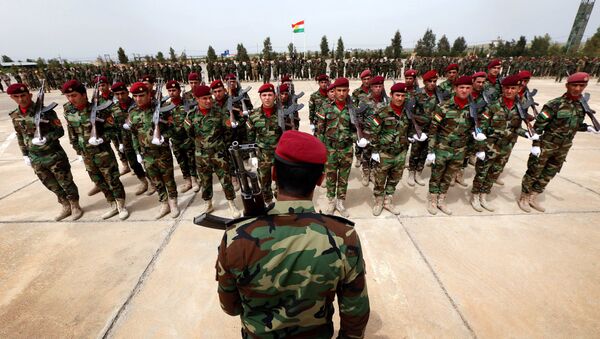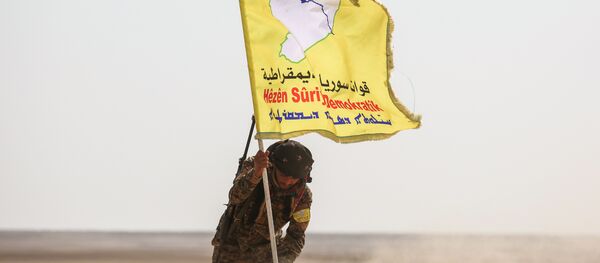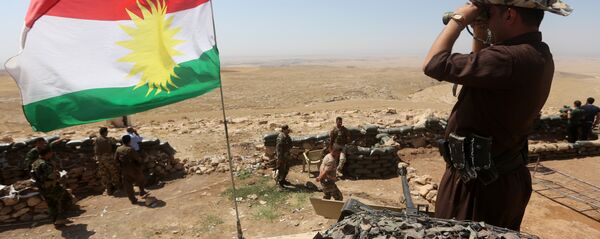Kurdish politicians seriously intend to create a sovereign state but the initiative is likely to face opposition from the Iraqi government and raise concerns in other regional nations.
Currently, Kurdish parties, first and foremost the Patriotic Union of Kurdistan and the Kurdistan Democratic Party, are forming a joint group to prepare for the referendum.
Kirkuk Problem
The Kurds are the largest ethnic minority in Syria, Iraq and Turkey. The ethnic group is striving to create their own independent state. Kurdistan in Iraq was created in 1970 based on an agreement with the Iraqi government, ending years of fighting. De facto Kurds established autonomy in 1991 following fierce clashes with Iraqi forces.
However, the Iraqi Kurdistan government wants to expand its territories, including with the oil-rich governorate of Kirkuk.
In 2014, Kurdish units repelled a Daesh offensive in the province while Iraqi forces retreated. Since the time, the region has been controlled by Kurdish forces.
Apparently, Baghdad will not get along with the loss of the Kirkuk large oil fields. Thus, the risk of a new Arab-Kurdish conflict remains.
Kirkuk is also a problematic point in the relations of Iraqi Kurdistan with Turkey. In April, Turkish President Recep Tayyip Erdogan criticized Kurds’ claims for the region and called to remove the Kurdistan flags in Kirkuk.
"We in Turkey do not agree that Kirkuk belongs to the Kurds. Kirkuk belongs to the Turkmens, Arabs and Kurds, all of them… Lower your flags immediately and put back the Iraqi ones," Erdogan said at a rally.
The president added that the failure to put back up the Iraqi flags might result in the degradation of the province's relationship with Turkey.
Erdogan’s statement indirectly marked a discord in Ankara-Erbil relations. Previously, the sides actively cooperated, including in energy. Turkey imports oil from Iraqi Kurdistan and is interested to maintain cooperation with the Barzani government.
If the secession of the region from Iraq sparks instability oil supplies to Turkey will be at risk. Thus, experts suggest that the Iraqi Kurdistan government will not be able to reach a compromise with Erdogan on the referendum.
"Turkey’s stance on the issue is still unclear. It is known that previously Barzani had contacts with Ankara. At the time, Turkey was loyal to the Iraqi Kurdistan government. But it is hard to say what could have happened to those contacts," Boris Dolgov, a senior expert at the Institute for Oriental Studies, the Russian Academy of Sciences, told RT.
At the same time, he suggested, Erbil should have received external support before announcing the independence referendum. It cannot be ruled out that the United States supported Barzani, after his visit to Washington in mid-May.
Domino Effect
In addition to the US, Israel is also an ally of Iraqi Kurdistan. Apparently, Israel will support the establishment of a sovereign Kurdish state.
"Israel always supported the creation of a Kurdish state and its territorial claims. Israel helped establish Peshmerga forces and Iraqi Kurdistan’s domestic security forces," Dolgov said.
Surrounded by geopolitical rivals, Israel is very interested in the implementation of the Kurdish project. Some experts suggest that Tel-Aviv will win if a new surge of instability hit the region.
Iran is on the opposite side of the barricades. Some experts say that Tehran plays the key role in maintaining stability in the Middle East. Moreover, there is a Kurdish diaspora in Iran, and the government is not interested in a rise of the Kurdish movement for independence.
In the long-run, the Kurdish movement is likely to become a significant force in the region. In their fight against Daesh, Kurdish unites proved their capabilities. In addition, the oil fields in Kirkuk would ensure the economic independence of the Kurdish state.
Countries with a large Kurdish population are not interested in the establishment of a sovereign Kurdish state. Despite the fact that Iraqi, Syrian, Iranian and Turkish Kurds have a number of differences, the creation of a sovereign state would galvanize their independence ambitions, according to Dolgov.
"This will deepen tensions not only in Iraq, but across the Middle East. Even preparation for the referendum may trigger a domino effect, from Syria to Turkey," the expert concluded.






